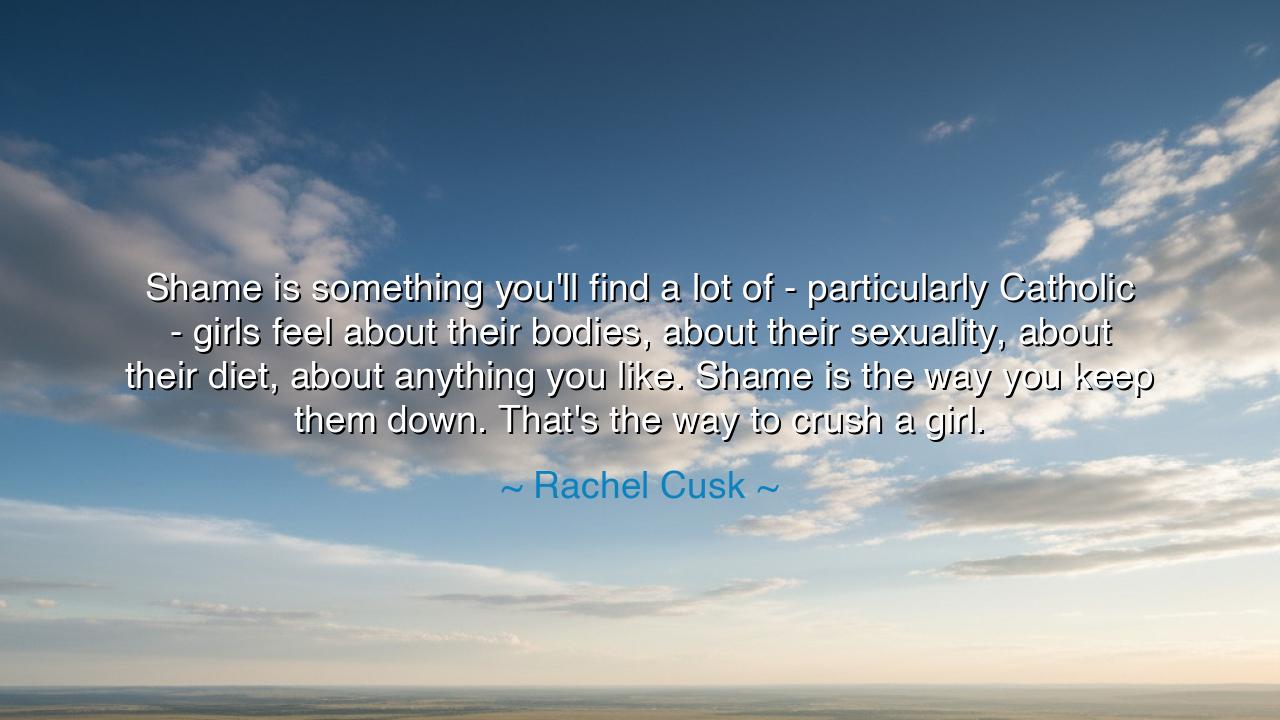
Shame is something you'll find a lot of - particularly Catholic -
Shame is something you'll find a lot of - particularly Catholic - girls feel about their bodies, about their sexuality, about their diet, about anything you like. Shame is the way you keep them down. That's the way to crush a girl.






When Rachel Cusk wrote, “Shame is something you'll find a lot of—particularly Catholic—girls feel about their bodies, about their sexuality, about their diet, about anything you like. Shame is the way you keep them down. That's the way to crush a girl,” she was not merely describing a social phenomenon—she was naming a weapon that has been used for centuries against the spirit of women. In her voice, one hears the echo of countless generations silenced not by chains of iron, but by chains of the mind. The ancients would have called this an enslavement of the soul—a quiet, invisible tyranny, more potent than force, because it teaches the captive to guard her own prison.
To understand her meaning, one must first know the nature of shame. It is not guilt, which arises from doing wrong. Shame is deeper, darker—it tells a person that they are wrong. It stains the very sense of self, whispering that one’s body, desires, or being is unworthy of dignity. In the ancient myths, shame appears as the shadow that follows innocence. When Eve ate the forbidden fruit, her first feeling was not defiance, but shame. She covered her body, believing it had become unclean. Thus began humanity’s long confusion: the body as both miracle and curse. Cusk’s insight pierces this wound, reminding us that such shame has been cultivated and passed down like a poisoned inheritance.
She speaks particularly of Catholic girls, but her meaning extends to all who have grown under the gaze of moral absolutism—where virtue is measured by silence, modesty, and obedience. In such systems, control is maintained not through physical chains but through spiritual conditioning. The girl who learns to distrust her body learns also to distrust her freedom. The woman who fears her hunger—whether for food, for love, or for life—becomes easy to govern. Thus, shame becomes not just emotion, but infrastructure: the invisible architecture of patriarchy, cloaked in piety.
History itself bears witness to this truth. In the Middle Ages, women who dared to claim knowledge or autonomy were branded as witches, punished not for evil, but for power. Joan of Arc, the warrior saint, was condemned in part for wearing men’s clothing—a sin, they said, against the natural order. Yet her true crime was courage. They could not destroy her by argument, so they used shame—a trial that accused her of immodesty, arrogance, and disobedience. The sword that ended her life was not sharper than the scorn that sought to define her. And so, Cusk’s words echo across centuries: shame is the most efficient weapon ever forged against the spirit of a woman.
But Cusk does not speak only to history—she speaks to the present. Today, the battleground has shifted, but the tactics remain the same. Now, shame hides beneath the language of beauty standards, moral judgment, and self-discipline. Girls are taught to count calories instead of dreams, to apologize for taking up space, to shrink their hunger—both literal and spiritual. And though the world claims to celebrate freedom, the message persists: be perfect, but not proud; be thin, but not strong; be visible, but not loud. In this way, the ancient cycle of control renews itself with every generation.
Yet, in Cusk’s insight, there is also resistance. To name shame is to strip it of its power. Once exposed, it cannot command in silence. The remedy for shame is not defiance alone, but reclamation—to look upon the body and see not sin, but sanctuary; to eat, to desire, to live without apology. The ancients would have called this act anagnorisis—a moment of recognition, when the hero sees the truth of who they are. For women, this recognition is revolutionary: to stand unashamed is to stand free.
So, let this teaching be passed down as law to the daughters of tomorrow: Do not let shame name you. You are not the vessel of another’s morality, nor the measure of another’s comfort. Your body is not a battlefield; it is a temple. Your hunger is not corruption; it is life asserting itself. To reject shame is not to reject virtue—it is to restore balance, to live as whole and unbroken as the gods intended.
For as Rachel Cusk reminds us, the world will always try to crush you with shame—but no chain can hold the one who refuses to kneel. And when a woman stands without shame, the world itself begins to tremble—for she has remembered her ancient power.






AAdministratorAdministrator
Welcome, honored guests. Please leave a comment, we will respond soon